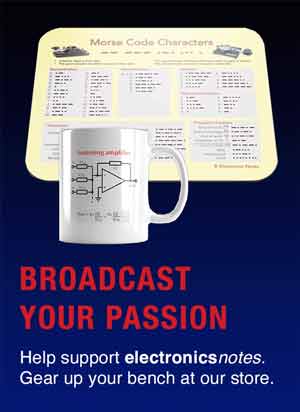Short-Term Tactics, Long-Term Vision: Charting Your Electronics Career
Planning your career means you need to have both short term goals and a long term vision of where you want to go.
Career Information Includes:
How to plan your career
Developing a positive attitude
Short & long term goals and vision
How to get promoted when working from home
Developing a fulfilling and successful career in electronics requires a dual focus: understanding the immediate steps you can take and envisioning your ultimate professional destination.
While long-term career planning provides the overarching direction, short-term career planning is the tactical engine that drives you forward, making the most of present opportunities.
Both are intrinsically linked and equally vital for navigating the dynamic world of electronics.
Short-Term Career Planning: The Tactical Advantage
Short-term career planning is about assessing your current position and identifying tangible goals achievable within the next year or so.
It's a more immediate and actionable approach, focused on leveraging current opportunities to build momentum.
Think of it as setting stepping stones that will eventually lead you towards your longer-term aspirations.
Key Aims of Short-Term Career Planning
The specific short-term goals you pursue will depend on your individual circumstances, available opportunities, and overall career trajectory.
However, some common and valuable short-term aims include:
Short Courses: Investing in targeted training for a specific technical skill or soft skill that is currently in demand or will be beneficial for your immediate career growth. This could involve mastering a new programming language relevant to your field, learning advanced design techniques, or developing crucial soft skills like effective team management or running productive meetings.
Taking on Additional Responsibility: Proactively seeking opportunities to expand your role and take ownership of new tasks or projects within your current position. Demonstrating your willingness to go the extra mile and contribute beyond your core duties showcases your commitment and potential for growth. However, it's crucial to be mindful of your capacity and avoid overstepping boundaries.
Developing a New Skill: Actively working to acquire a new competency, whether through formal training, independent study, or on-the-job learning. This could involve delving into a specialized area of electronics that interests you or mastering a tool or technology that will enhance your capabilities.
Taking the Initiative: Being proactive and identifying areas where you can contribute without explicit instruction. Employees who demonstrate initiative, offer solutions, and anticipate needs are highly valued and stand out as potential leaders. This requires a keen understanding of your role and the broader organizational goals.
Long-Term Career Planning: Defining Your North Star
In contrast to the immediate focus of short-term planning, long-term career goals delve into the bigger picture.
It involves introspection and answering fundamental questions about your values, passions, and ultimate aspirations within the electronics field.
Where do you envision yourself in five, ten, or even twenty years? What kind of impact do you want to make? What aspects of electronics truly resonate with you?
Long-term career planning typically considers periods of five years or more, providing an overarching sense of direction for your professional journey. While the timeframe may seem distant, establishing these ultimate goals acts as your "North Star," guiding your decisions and efforts along the way.
Career Core Values: The Foundation of Long-Term Goals
Long-term career goals often revolve around your core career values. These are the fundamental principles that drive your professional satisfaction and guide your choices.
Defining these values, which might include a desire for work-life balance, a passion for a specific area of electronics, or an ambition to reach a leadership position, can take time and introspection.
However, once identified, these core values provide a strong framework for your long-term aspirations.
Training and Skills Required for Your Career Path
Once you have a clearer understanding of your core values and long-term aims, it's crucial to conduct an honest self-assessment.
Seek feedback from trusted friends, mentors, and family to gain insights into your strengths and weaknesses.
With a defined career path in mind, you can then identify the specific skills and training required to reach your desired destination. This might involve pursuing additional academic qualifications (Bachelor's, Master's, MBA), gaining specific industry experience, or undertaking targeted training to acquire new technical or managerial skills (e.g., project management, leading difficult conversations, running effective appraisals).
The Importance of Flexibility and Re-evaluation
While establishing a long-term direction is essential, remember that the journey is rarely linear. Life circumstances change, new opportunities arise, and your interests within electronics may evolve.
Therefore, it's crucial to remain flexible and regularly re-evaluate your long-term goals. This periodic reassessment allows you to adapt your plans based on your experiences and new insights, ensuring that your career path remains aligned with your evolving aspirations.
You might discover a particular niche within electronics that ignites a passion you hadn't previously recognized, or your personal priorities might shift, requiring adjustments to your long-term vision.
The Synergistic Power of Short and Long-Term Planning
Short-term and long-term career planning are not mutually exclusive but rather complementary. Your short-term actions should ideally align with your long-term vision.
The skills you develop in the short term, the responsibilities you take on, and the initiatives you pursue should all contribute to your broader career goals.
By strategically combining short-term tactics with a clear long-term vision, you can navigate the complexities of the electronics industry with purpose and direction, maximizing your potential for a fulfilling and successful career. Embrace both the immediate opportunities and the distant horizons to chart a course that truly aligns with your aspirations and values.
 Written by Ian Poole .
Written by Ian Poole .
Experienced electronics engineer and author.
More about becoming an engineer:
Career planning
Continuing professional development, CPD
What is electronic engineering?
Job application
PI Insurance
How to work from home
How to set up your own business
Return to Becoming an Engineer . . .




